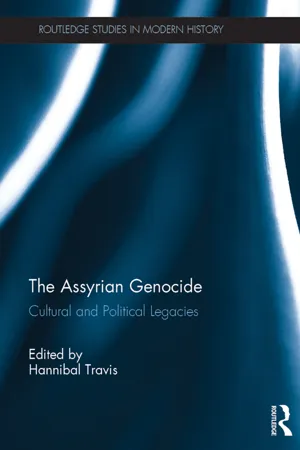
- 316 pages
- English
- ePUB (mobile friendly)
- Available on iOS & Android
About This Book
For a brief period, the attention of the international community has focused once again on the plight of religious minorities in Iraq, Syria, and Turkey. In particular, the abductions and massacres of Yezidis and Assyrians in the Sinjar, Mosul, Nineveh Plains, Baghdad, and Hasakah regions in 2007–2015 raised questions about the prevention of genocide. This book, while principally analyzing the Assyrian genocide of 1914–1925 and its implications for the culture and politics of the region, also raises broader questions concerning the future of religious diversity in the Middle East. It gathers and analyzes the findings of a broad spectrum of historical and scholarly works on Christian identities in the Middle East, genocide studies, international law, and the politics of the late Ottoman Empire, as well as the politics of the Ottomans'British and Russian rivals for power in western Asia and the eastern Mediterranean basin.
A key question the book raises is whether the fate of the Assyrians maps onto any of the concepts used within international law and diplomatic history to study genocide and group violence. In this light, the Assyrian genocide stands out as being several times larger, in both absolute terms and relative to the size of the affected group, than the Srebrenica genocide, which is recognized by Turkey as well as by international tribunals and organizations. Including its Armenian and Greek victims, the Ottoman Christian Genocide rivals the Rwandan, Bengali, and Biafran genocides. The book also aims to explore the impact of the genocide period of 1914–1925 on the development or partial unraveling of Assyrian group cohesion, including aspirations to autonomy in the Assyrian areas of northern Iraq, northwestern Iran, and southeastern Turkey. Scholars from around the world have collaborated to approach these research questions by reference to diplomatic and political archives, international legal materials, memoirs, and literary works.
Frequently asked questions
Table of contents
- Cover
- Title
- Copyright
- Dedication
- Contents
- List of figures and tables
- List of contributors
- Acknowledgements
- Glossary
- List of judicial decisions cited
- Table of legislation
- 1 The Assyrian genocide across history: collective memory, legal theory, and power politics
- 2 The term Seyfo in historical perspective
- 3 The atrocities against the Assyrians in 1915: a legal perspective
- 4 The Ottoman genocide of the Assyrians in Persia
- 5 Abduction, rape, and genocide: Urmia’s Assyrian girls and women
- 6 Genocide/Seyfo – and how resistance became a way of life
- 7 Lady Surma: the pillar of the Assyrian nation, 1883–1975
- 8 The Assyrian delegation at the Paris Peace Conference
- 9 The Assyrian “concept of unity” after Seyfo
- 10 Exile or extinction: the Assyrian genocide from 1915 to 2015
- 11 Epilogue: tombstones and inverted crosses
- Index